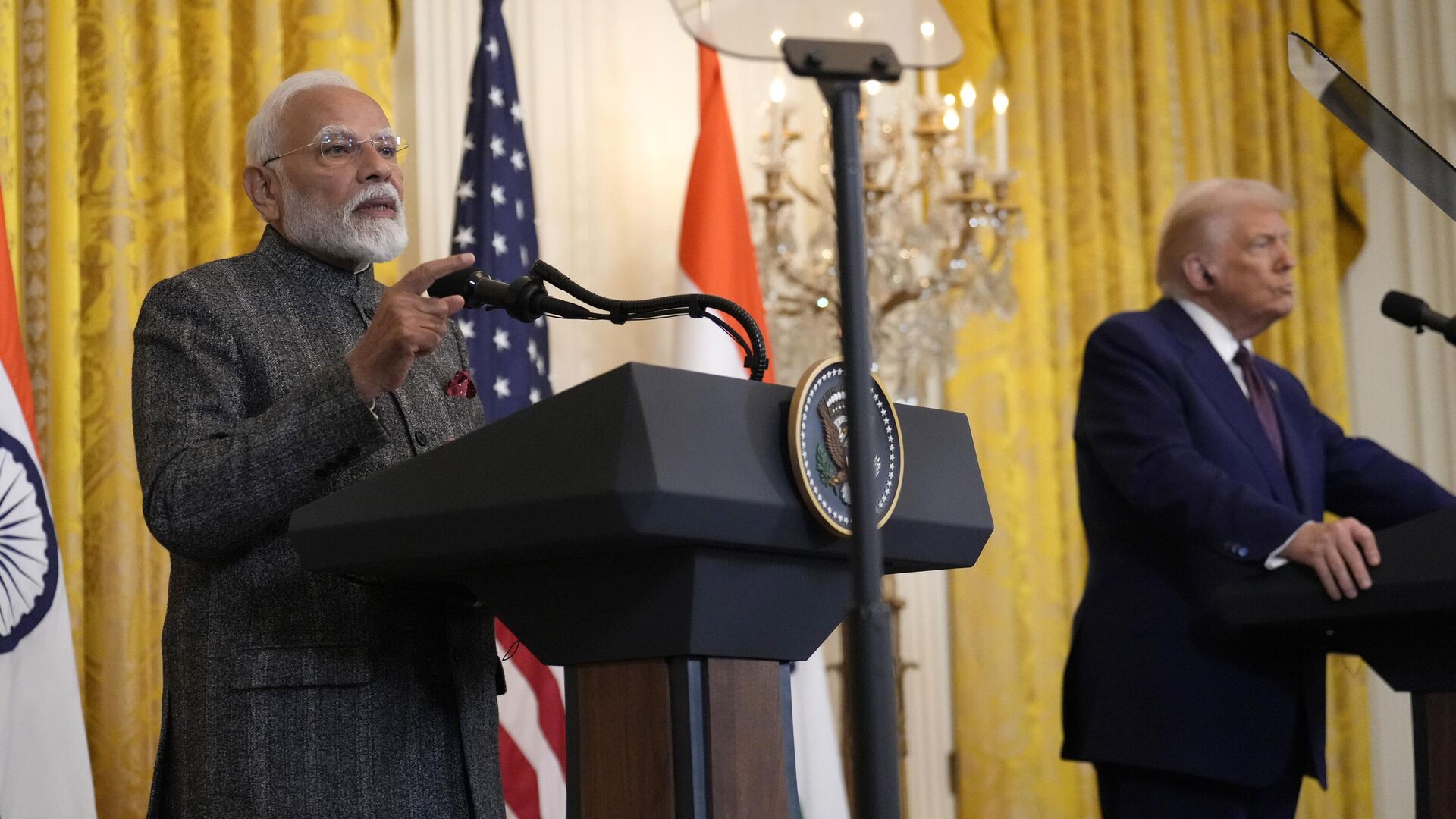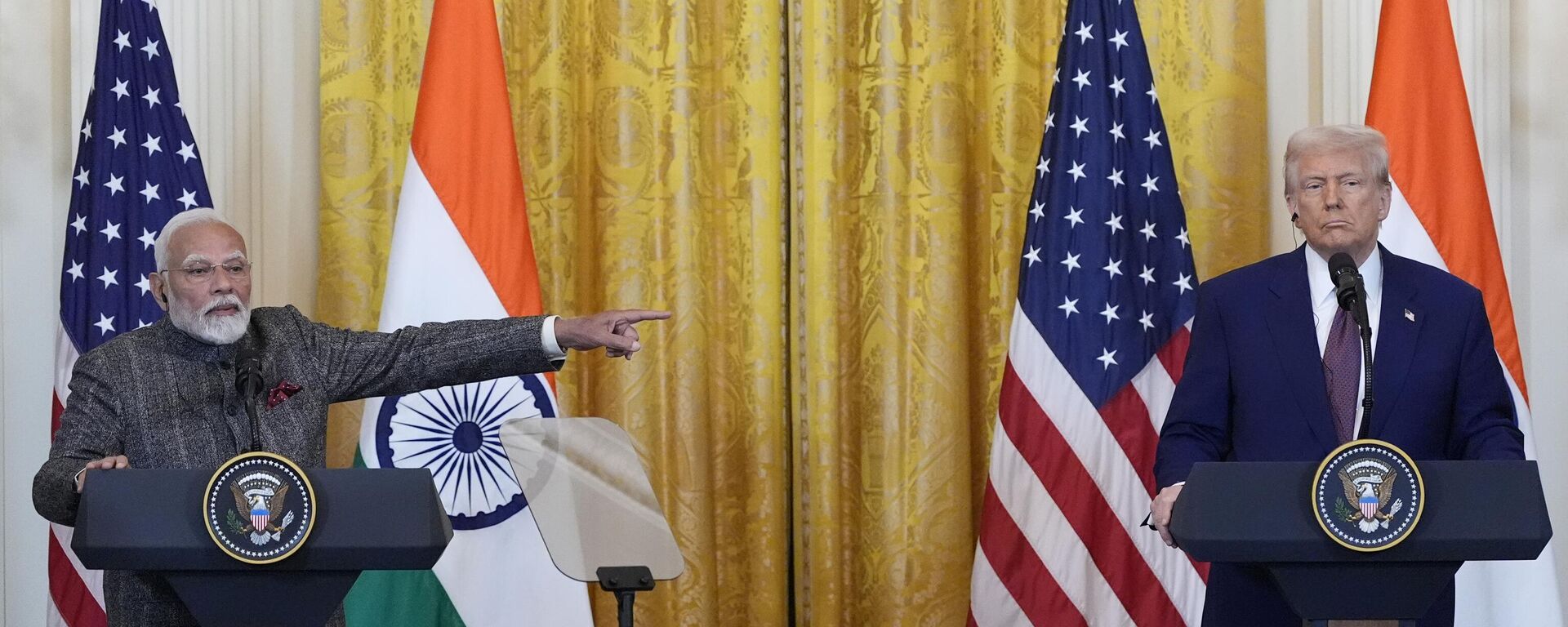https://sputniknews.in/20250219/deciphering-indias-move-on-tariff-cuts-8789716.html
Deciphering India's Move on Tariff Cuts
Deciphering India's Move on Tariff Cuts
Sputnik India
India's decision to reduce duties on American imports to avoid President Donald Trump's reciprocal tariffs could spur similar demands from other trading partners
2025-02-19T17:16+0530
2025-02-19T17:16+0530
2025-02-19T19:12+0530
business & economy
donald trump
piyush goyal
nirmala sitharaman
india
us
new delhi
european union (eu)
trade barriers
alcohol
https://cdn1.img.sputniknews.in/img/07e9/02/13/8791259_0:0:3072:1728_1920x0_80_0_0_9f72aaefecc6e7141682ea411566582d.jpg
Reducing duties on American imports to avoid avoid reciprocal tariffs from President Donald Trump could lead to similar demands from other trading partners, experts have told Sputnik India.India's 150% tariff on imported alcoholic beverages (50% basic customs duty and 100% agricultural infrastructure development fund cess) were an issue not only with the US, but also with the United Kingdom (UK) and European Union (EU), with which India has been negotiating free trade agreement (FTA), Chakraborty explained. Even the Australia-India Economic Cooperation and Trade Agreement (AI-ECTA), which came into effect in December 2022, has led to a reduction of import duties to the tune of 75% on Australian wine exports, he added.India's alcoholic beverage sector is the world's third biggest, and estimated to grow to $55 billion by 2027, according to United States Department of Agriculture (USDA). The USDA stated that "high tariffs" have undercut US ability to compete with exporters from Australia, South America and the EU.The World Trade Organisation (WTO) rules clearly mandated that every country should have a "uniform set of tariffs" for all the nations, Chakraborty stressed.For instance, Finance Minister Nirmala Sitharaman announced duty cuts on high-end motorcycles, cars, and smartphone parts in the Budget speech this month.Further, the professor recalled that both India and the US might have to develop a "special framework" if India indeed decided to increase its energy imports from the US, which was announced by President Trump during the joint presser with Prime Minister Modi at the White House last week.The two leaders announced that both governments would aim would to negotiate the "first tranche" of a trade deal by autumn 2025 and increase bilateral trade to $500 billion by 2030. India could increase its energy imports from the US to $25 billion from the current $15 billion level, according to Foreign Secretary Vikram Misri."In 2023, India won a case against the US after a WTO dispute resolution panel stated that American domestic content requirements and subsidies provided in the renewable energy sector were "incompatible" with the norms of General Agreement on Trade and Tariffs (GATT)," the foreign trade expert said.The US had also approached the WTO back in 2013, challenging India's solar policy mandating solar power developers to buy and use domestic cells, Chakraborty recalled.The "out-of-turn" duty reduction on American bourbon was obviously done to reassure the Trump administration of Indian intent to bring down tariffs and to pre-empt any retaliatory action, Vinod Giri, the Director General of Brewers Association of India (BAI) told Sputnik India, echoing concerns with respect to the wine and spirits sector.Reducing duty on hard spirits like bourbon could "distort the level-playing field" in favour of hard liquor, which wasn't a "desired public policy", he said.The government should therefore consider duty reduction also on low alcohol beverages such as beer which is also what the global health bodies recommend, Giri suggested."The US, anyway, has a massive culture of beer, especially craft beer which is in nascent phase in India and a duty reduction on beer would benefit the industry and Indian consumers by enriching the consumption experiences in a more responsible manner," the BAI head concluded.
https://sputniknews.in/20250214/how-is-india-navigating-trumps-reciprocal-tariff-challenge-8772457.html
india
us
new delhi
france
europe
Sputnik India
feedback.hindi@sputniknews.com
+74956456601
MIA „Rossiya Segodnya“
2025
Dhairya Maheshwari
https://cdn1.img.sputniknews.in/img/07e6/0c/13/138962_0:0:641:640_100x100_80_0_0_2cb44360dbcdf6d84bf4b299cd045917.jpg
Dhairya Maheshwari
https://cdn1.img.sputniknews.in/img/07e6/0c/13/138962_0:0:641:640_100x100_80_0_0_2cb44360dbcdf6d84bf4b299cd045917.jpg
News
en_IN
Sputnik India
feedback.hindi@sputniknews.com
+74956456601
MIA „Rossiya Segodnya“
Sputnik India
feedback.hindi@sputniknews.com
+74956456601
MIA „Rossiya Segodnya“
Dhairya Maheshwari
https://cdn1.img.sputniknews.in/img/07e6/0c/13/138962_0:0:641:640_100x100_80_0_0_2cb44360dbcdf6d84bf4b299cd045917.jpg
trump trade, trump on wto, trump news, trump tariffs, trump trade war, trump reciprocal tariffs, trump reciprocal tariffs india, modi trump meeting, modi news, trump news, us bourbon, american whiskey exports, us energy exports, us india trade
trump trade, trump on wto, trump news, trump tariffs, trump trade war, trump reciprocal tariffs, trump reciprocal tariffs india, modi trump meeting, modi news, trump news, us bourbon, american whiskey exports, us energy exports, us india trade
Deciphering India's Move on Tariff Cuts
17:16 19.02.2025 (Updated: 19:12 19.02.2025) India announced almost 50% cut in duty on US bourbon imports, according to a February 13 notification. Commerce Minister Piyush Goyal said on Tuesday more tariff reductions could follow from both sides under a bilateral trade deal with the US.
Reducing duties on American imports to avoid avoid reciprocal tariffs from President Donald Trump could lead to similar demands from other trading partners, experts have told Sputnik India.
"While reducing tariffs for the US in a bid to improve the political relationship with the Trump administration might benefit India, such a move also risks having similar demands from other countries. If things come to that, it would be very difficult for India to accommodate these demands from other countries," cautioned Debashis Chakraborty, a professor at Indian Institute of Foreign Trade (IIFT).
India's 150% tariff on imported alcoholic beverages (50% basic customs duty and 100% agricultural infrastructure development fund cess) were an issue not only with the US, but also with the United Kingdom (UK) and European Union (EU), with which India has been negotiating free trade agreement (FTA), Chakraborty explained. Even the Australia-India Economic Cooperation and Trade Agreement (AI-ECTA), which came into effect in December 2022, has led to a reduction of import duties to the tune of 75% on Australian wine exports, he added.
India's alcoholic beverage sector is the world's third biggest, and estimated to grow to $55 billion by 2027, according to United States Department of Agriculture (USDA). The USDA stated that "high tariffs" have undercut US ability to compete with exporters from Australia, South America and the EU.
The World Trade Organisation (WTO) rules clearly mandated that every country should have a "uniform set of tariffs" for all the nations, Chakraborty stressed.
"The tariffs India charges on American imports can't be different from what it is charging on the same category imports from other nations. If President Trump is advocating a differing set of tariffs on different countries based on reciprocal basis, he is essentially dealing a blow to the WTO structure. While how things unfold in the near future is anybody's guess, in the short-term, the WTO norms are going to be affected," the foreign trade expert explained.
For instance, Finance Minister Nirmala Sitharaman announced duty cuts on high-end motorcycles, cars, and smartphone parts in the Budget speech this month.
Further, the professor recalled that both India and the US might have to develop a "special framework" if India indeed decided to increase its energy imports from the US, which was announced by President Trump during the joint presser with Prime Minister Modi at the White House last week.
The two leaders announced that both governments would aim would to negotiate the "first tranche" of a trade deal by autumn 2025 and increase bilateral trade to $500 billion by 2030. India could increase its
energy imports from the US to $25 billion from the current $15 billion level, according to Foreign Secretary Vikram Misri.
Both countries have a recent history of moving the WTO for disputes arising in the energy sector, Chakraborty pointed out.
"In 2023, India won a case against the US after a WTO dispute resolution panel stated that American domestic content requirements and subsidies provided in the renewable energy sector were "incompatible" with the norms of General Agreement on Trade and Tariffs (GATT)," the foreign trade expert said.
The US had also approached the WTO back in 2013, challenging India's solar policy mandating solar power developers to buy and use domestic cells, Chakraborty recalled.
"So, if President Trump is asking India to increase its oil and gas imports in line with his 'drill, baby drill' policy, there has to be a special framework which might need to be created to accommodate this demand, as the Trump administration is expected to subsidise oil and gas sectors," he explained.
The "out-of-turn" duty reduction on American bourbon was obviously done to reassure the Trump administration of Indian intent to bring down tariffs and to pre-empt any retaliatory action, Vinod Giri, the Director General of Brewers Association of India (BAI) told Sputnik India, echoing concerns with respect to the wine and spirits sector.
"Bourbons, like Harley Davidson motorbikes, have high optics value due to their frequent mentions by Mr Trump himself. But, though the reduction for now is only on bourbon, I don’t think the government will be able to hold back on demands for similar reductions from other countries because most FTAs have the Most Favoured Nation (MFN) clause to match best offers," Giri stated.
Reducing duty on hard spirits like bourbon could "distort the level-playing field" in favour of hard liquor, which wasn't a "desired public policy", he said.
The government should therefore consider duty reduction also on low alcohol beverages such as beer which is also what the global health bodies recommend, Giri suggested.
"The US, anyway, has a massive culture of beer, especially craft beer which is in nascent phase in India and a duty reduction on beer would benefit the industry and Indian consumers by enriching the consumption experiences in a more responsible manner," the BAI head concluded.



